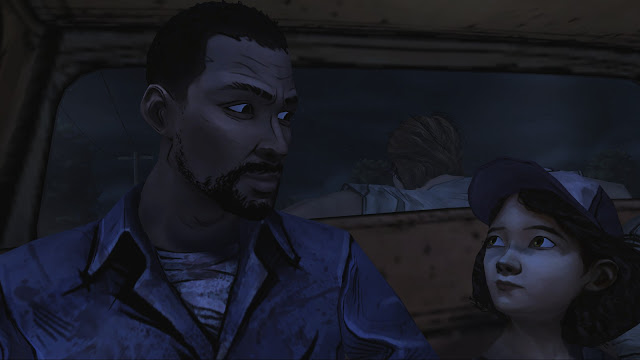I picked up The Walking Dead last week when it was on sale for $15. I had been hearing a lot of good things about the game from both Game Informer and PC Gamer, so I figured I couldn't go wrong. I'll try to write this review without giving too many spoilers.
The Walking Dead takes place in the same universe as the comics and TV show, but it is an entirely new cast. I think this is probably for the best, because a lot of games that try to recreate a movie exactly fail miserably. It is also being released episodically, which means that you pay once for the game, and when each new episode is ready you get to play it. I think their plan was to release them monthly, but the third was a little late.
You are placed in the role of Lee Everett, who at the beginning of the game is in the back of a police car on his way to prison. Very soon after the zombies start popping up, you meet Clementine, an eight year old whose parents were away in Savannah when the outbreak happened. Obviously her motivation is to find her parents, and Lee's motivation is to protect her at all costs.
A theme that pops up on a fairly regular basis is the effect that all of this apocalypsness can have on the people who are living through it. This is conveyed several times by showing Clementine seeing something awful happen.
The gameplay is driven by quicktime events, puzzles, and choices.
The quicktime events only occur when you have gotten grabbed by zombies or are otherwise in immediate danger. They aren't ridiculous, mostly just mashing Q and then hitting E to finish it off.
Obviously the puzzles take place in between high-action parts of the game, and usually involve figuring out how to open this door to get this item which you need to complete this task. Oftentimes the areas with puzzles also provide a nice opportunity to chat with other members of your group and get to know them better.
Speaking of the characters, they are the ones that drive the story, and almost all of the choices you have to make have some direct effect on the members of your group. Some are blatant "save person A or person B," but others are more subtle ones that depend on dialogue options or how you decide to divvy up the dwindling supplies. The screenshot above is of me deciding to chop off a guy's leg to free him from a bear trap; I didn't fully realize it at the time, but I could have chosen not to do it. I was just doing what I thought was necessary. I tried everything else first, I swear.
The fact that the consequences of your actions are not immediately apparent is what really sells the sense of realism for me. For example, after I lost a certain character, I spent a long time (outside of the game during my real life, mind you) analyzing all of the choices that I had made leading up to their death. I was trying to think of a way to save them, but I'm still not sure if I could have done anything. The fact that I don't know if the event was scripted or happened because of my choices really shows you how well it is doing its job. I am probably not going to go back to try to change that moment, because I feel that that would cheapen the experience.
Here are a few more screenshots for your viewing pleasure.
 |
| The game is notorious for little bugs like this one. There should be a kid in her arms. |
To see all of the screenshots I have taken, go to my Steam page.
EDIT: See my review of Episode 4 here.









No comments:
Post a Comment
Note: Only a member of this blog may post a comment.